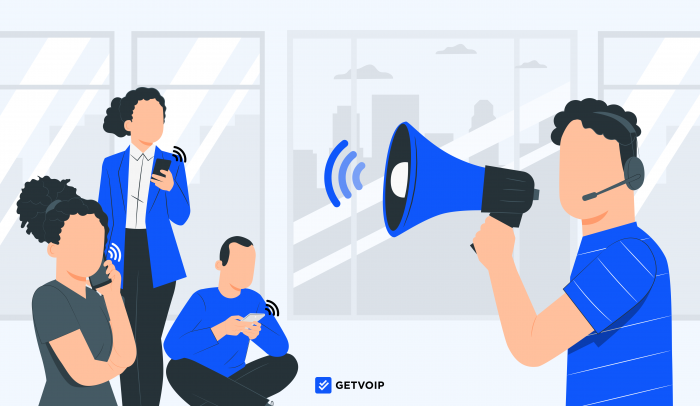Automated call blasting significantly reduces call center costs and saves time–but understanding best practices, legality issues, and common mistakes ensure your team gets the most out of the technology.
This article defines call blasting, explains how it works, outlines benefits and TCPA compliance rules, and quickly reviews top call blasting providers.
- Overview
- How it Works
- When to Use
- When Not to Use
- Best Practices
- Is it Legal?
- Mistakes to Avoid
- Benefits
- Providers
What is Call Blasting?
Call blasting is a VoIP technology that uses outbound automation to simultaneously send hundreds or thousands of pre-recorded voice messages to lead lists, existing customers, and other call groups.
Also known as voice broadcasting or robocalling, call blast software makes a high number of concurrent calls without the need for live agents. This lets businesses save on overhead costs and reach large groups of people instantly.
How Call Blasting Works
Call blasting works similarly to email blasting, and the process is:
- Step One: A user creates a contact list (campaign lists, customer segments, etc.)
- Step Two: The user records their desired message or creates the message via text-to-speech (messages can be personalized with the customer’s name, etc.)
- Step Three: The user uploads the message to a voice broadcasting software application.
- Step Four: At a preselected time, the call blast solution simultaneously dials all the phone numbers on the list, then plays the prerecorded message
- Step Five: The call blast recipient hangs up or uses the outbound IVR system to respond with their own audio message or schedules a customer callback for a later time.
When You Should Use Call Blasting
- To disseminate information: Voice broadcasting quickly relays important information to a large group of people–especially valuable in limited-time-only opportunities or emergencies
- To guide your customers through specific processes: Call blasts can be used to remind, assist, and onboard customers without a live agent
- For customers who have opted in: Marketing via blasting isn’t always illegal. If your customers opt-in to receiving alerts and messages from your business, you’re legally allowed to use pre recorded messages
When You Should Not Use It
- Cold Call Marketing: Call blasting should not be used for marketing, as it can be irritating to customers and is often illegal
- Fraud: Robocalling is infamously used for many scams as it is an inexpensive way to reach large numbers of people
Call Blasting Best Practices
- Record it yourself: While many providers offer text-to-speech, recording your actual voice for call blasting makes the message more personal and yields better results
- Cater to your audience: Be aware of who you are sending the voice message to, and create different messages for each list/customer segment
- Keep it short and simple: To ensure recipients actually listen to the message, experts recommend keeping it to 30 seconds or less in length
- Be courteous: Voice messages (even short ones) may be seen as an intrusion–use polite, respectful language to demonstrate gratitude for their time
- Update DNC lists regularly: Even customers who opt in can, by law, opt out at any time–avoid violations by regularly updating DNC lists
- Test, monitor, and improve: Conduct A/B testing across different types of messages to identify which ones most appeal to your customer base. Continue to monitor and improve your approach for the best results.
Is Call Blasting Legal?
The legality of call blasting is dependent on usage.
While call blasting is acceptable when used for disseminating important information, robocalling for advertising purposes is notoriously unpopular with consumers. In most countries, using call blasting for marketing is illegal. In some places, it is legal as long as there is informed, written consent. Of course, it is always illegal to use robocalling for fraud.
While there are accepted uses of the tech, fines can be quite large for violations.
Common Mistakes to Avoid
- Not maintaining correct customer information: Update call lists regularly to scrub nonworking or disconnected numbers, and verify “Do Not Call” lists are current
- Not getting consent: Calling someone on the DNC list without express consent can result in large fines, so always obtain express, written consent from customers before starting a call blasting campaign
- Outsourcing to a call center: Outsourcing makes it difficult to enforce compliance regulations, and most countries that ban blasting to specific customers will fine your company, not the firm you hired to manage call basting for you
- Creating a voice message that is long, vague, or confusing: Call blasting messages should be clear, concise and easy to understand for a wide range of audiences
What Call Blasting Can Do for My Business
- Help customers navigate self-service options: Walk customers through an online purchase, the onboarding process, account updates, and other specific process
- Helping customers complete customer satisfaction surveys: Quickly send out hundreds of surveys collect customer feedback
- Appointment scheduling: Notify customers of available appointments, guide them through scheduling, remind them the day before and follow up after the appointment
- Urgent notifications: Call blasting can be used by schools and businesses that may need to contact a large group of people quickly about an emergency
- Informational Calling: Relay important information about an upcoming event, election, fundraiser, service outage, etc.
Call Blast Software Providers
| Pricing | Key Call Blasting Features | Best for | |
| CloudTalk | $25-$50 per user/month |
|
Small outbound call centers |
| Vonage | Voice API starts at $0.027 per call |
|
Small contact centers that need a custom solution |
| CallFire | $99-$599 per month |
|
Startups and small businesses |
| Twilio | Programmable Voice API pay-as-you-go pricing starts at $0.014 per minute |
|
Large contact centers and enterprises needing a custom solution |
| Genesys | $75-$155 per user/month |
|
Blended contact centers that need a unified solution |




